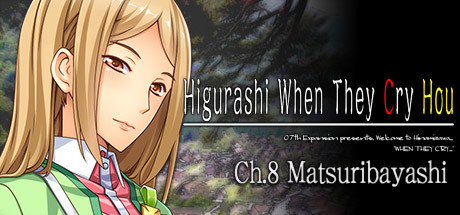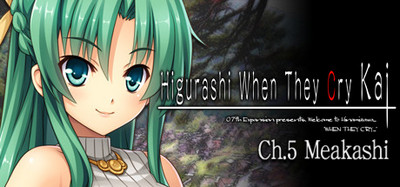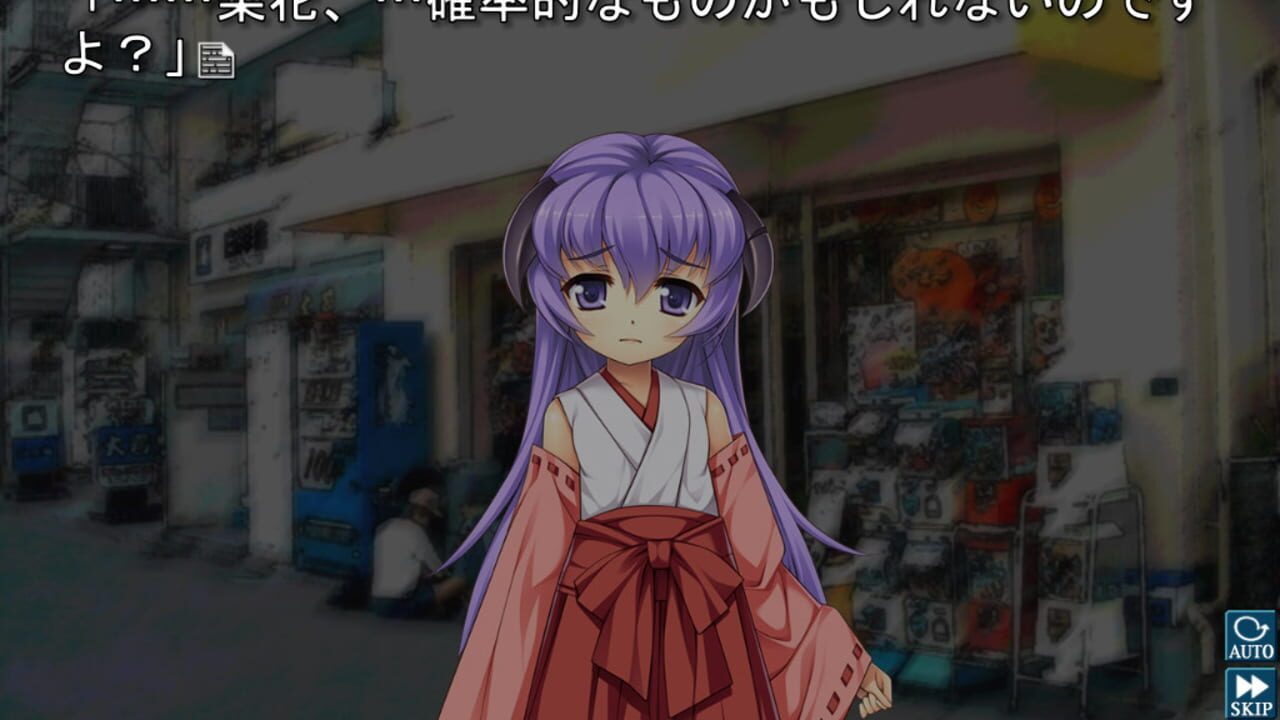Higurashi When They Cry Hou - Ch.5 Meakashi. Global Achievements% of all players. Total achievements: 16 You must be logged in to compare these stats to your own 46.9%. Goodbye, Sister Broke out of a prison. Hello, Sister Reunited with a close relative. A Hopeless Pair. Himatsubushi-hen (暇潰し編, Time Wasting Chapter), is the fourth and last question arc in the Higurashi no Na ku Koro ni series, released on August 13, 2004. It is shorter than the previous arcs, with only two chapters, and takes place five years before them. It is preceded by Tatarigoroshi-hen and is followed by Higurashi no Na ku Koro ni Kai, beginning with Meakashi-hen.
Another few months have passed, and another chapter of Higurashi has been released. I have been reviewing this series as the new translated versions have been coming out from MangaGamer, and after reviewing the fourpartQuestionArc, it is finally time to dive into the Answer Arc, Higurashi: When They Cry Kai.
Higurashi: When They Cry Hou Chapter 5 – Meakashi Review
Platform: PC
Developer: 07th Expansion
Publisher: MangaGamer
For those unfamiliar with the series, Higurashi is the story of Hinamizawa, a mysterious remote Japanese village with dark origins that also serves as a den for supernatural and suspicious activity that is gradually revealed throughout the games, which all begin with a far more innocent and fun vibe than the dark and more dismal tone they can adopt near the end. As the fifth installment, Meakashi captures what one would expect of the Higurashi series up to this point, by balancing elements of horror, mystery, and thriller into a distinct concoction with a slightly different flavor in every installment.
Meakashi serves serves as an accompanying story to the second chapter of Higurashi, Watanagashi. One that focuses on the character of Shion Sonozaki and to a lesser extent, her twin sister Mion. The first half serves as a prelude of sorts, delving more into Shion as a character in her own right, her relationship to the rest of the Sonozaki family, and her relationship with the character of Satoshi Houjou. While the second half runs parallel to Watanagashi, telling Shion’s perspective of events before the perspective then shifts over to that of the antagonist of that installment, explaining how they did what they did, and the reasoning for why.
Due to this change in perspective and the breaking away at the previously established structure, Meakashi has a notably different feel than other entries in the series, with a greater emphasis on trauma and psychological justifications for character’s actions as they are pushed to morbid and dark extremes that stand out as gruesome even considering what was featured in the Question Arcs. In spite of this change, the high bar of storytelling from the prior entries in maintained. Characters feel distinct and reasonable. The tone manages to shift well from sweet and innocent moments to unsettling sequences rife with a certain breed of horror. While the storyline itself manages to remain compelling and interesting, despite how every player presumably knows how things end by virtue of this story being a parallel tale.
Despite all of that, there were quite a few things about the story that made me scratch my head, or minor questions that were seemingly never answered. For example, considering her life circumstances up until that point, where did Shion go to school prior to escaping from the catholic school in the first chapter? How exactly did she arrange her escape in the first place? After Shion begins attending school in the neighboring city to Hinamizawa, she supposedly makes friends, but what are they like and why are they never mentioned beyond one or two instances?
Considering how much or a role Shion’s part-time job plays in her day to day activities, why is it never shown in the story? Why are the first few chapters of Watanagashi effectively skipped over despite Shion playing a large role during them? Are the prisoners in the underground torture room near starvation or dehydration, seeing as how some of them went up to three days without either food or water?
There are also a few decisions about the story that I could not help but find questionable. For instance, much of the latter half of the story is driven by Shion’s love for Satoshi and how much she enjoyed her time with him. However, there are only a few scenes that portray their relationship, and they do not make the relationship seem as strong and pure as the latter portions are relying on it being.
There’s also the very questionable treatment of the character of Satoko. An eleven-year-old girl and the sister of Satoshi. Throughout the story, she is emotionally abused, physically abused, and tortured via mutilated to the point of death. All by the protagonists of this story no less. While I am admittedly very accustomed to depravity and dark subject matter, and can forgive fictional characters for doing a lot of horrible things, the mere concept combined with the depraved, misguided, and selfish reasoning behind the execution is something that I find utterly irredeemable of any character. It is also something that I will be unable to disassociate with the character whenever they appear in subsequent installments, even though they take place in different timelines.
Speaking of which, by being a parallel story to Watanagashi and taking place in the same timeline, Meakashi carries with it both good and bad narrative baggage. The good comes from how the player is, presumably, familiar with the events of Watanagashi and know what is going on with other characters. It allows the story to skip over redundant information, and allow for players to better take in the meaning and impact behind the actions of characters from both stories. In a sense, it enhances both of them by a large amount because of this. However, there are also elements of Watanagashi, that have a more negative impact.
There are points where Meakashi can feel as if it is constrained by needing to fit in with Watanagashi, resulting in some flimsy explanations from the protagonist, or decisions that are not as thoroughly explained as they should be. The doll subplot, which I was very critical of in my review of Watanagashi is somehow even less believable in Meakashi. While the decision to dismiss the exposition dump from the end of Watanagashi is head scratching at best. Also, the ending twist of Watanagashi is never even remotely addressed, despite that being my biggest looming questions about that chapter.
Moving on, as has been established in prior reviews, Higurashi is technically known as a sound novel, which is basically a visual novel with a lighter emphasis on the visuals, as the original release of the game consisted of expressive yet amateurishly drawn sprites for the main characters, blurred photo backdrops, and a lot of black screens. Alternate sprites are made available for the western releases by MangaGamer, featuring newly drawn sprites by an artist known as Kurosaki. I personally do not care much for the glossy look many of these sprites have, the and the more exaggerated features some of them, as if the artist was trying to give the characters more sex appeal, which is really weird.
Personally, I prefer to play these games using the 07th Mod, a handy dandy tool that effectively turns this PC version of Higurashi into the more recent Playstation 3 release, which features a widescreen resolution, new anime-esque sprites, new backgrounds, CG artwork for specific scenes, and full voice acting for every character. It’s Japanese voice acting, obviously, but the actors are able to bring the characters to life with each line, and greatly improve the atmosphere. However, the mod recently underwent some changes that made it impossible to switch between the PS3 assets and the original assets freely, for reasons I do not understand. Regardless, I still find this to be the best way to experience the Higurashi games.
As for the soundtrack, Meakashi marks the point where the Higurashi games started moving away from non-licensed free music tracks and started using its own soundtrack in addition to the non-licensed tracks. This updated score allow the game to no longer rely on the same track for every other dramatic scene, and features a higher level of quality. The end result is an imposing and atmospheric score that does a lot to establish the mood and tone of the story, and can be genuinely soothing or creepy on its own.
As it stands, Meakashi is a murder fueled thriller about the depravities and extremes a person may be pushed to when their problems compound and their emotional and psychological issues begin to gnaw away at them. It builds off of the original story in interesting ways and serves as an excellent companion piece. However, a few missteps and the absence of a few details left me feeling that more could be done with this entry. Regardless though, it is still a welcome addition to the Higurashi storyline that left me curious just how things will progress and evolve as the second half continues on. Which, considering that the three remaining chapters are now being edited, should not take too long. I just hope none of them contain any more rampant child abuse.
Higurashi When They Cry Kai: Ch.5 - Meakashi on PC


Higurashi When They Cry is a sound novel. The music, backgrounds and characters work together to create a world that is the stage of a novel for the user to read. They laugh and cry and get angry. The user takes the point of view of the protagonist to experience the story.
The 58th year of Shouwa, early summer
It’s June, and the summer heat has arrived earlier than it does most years.
By day there are crickets, and by night there are cicadas.
We’re in Hinamizawa, a small village in the countryside.
There are fewer than two thousand people here. But every year, there is an event.
This event is a mysterious death.
(The series has run from 1979 to 1983)
On a certain day in June, someone dies, and someone else goes missing.
The series of deaths is connected to the upheaval surrounding the dam construction project.
A murder case that was covered up is being reenacted.
Is it a conspiracy? A coincidence? Or perhaps a curse?
Someone who was supposed to be there isn’t.
Someone who wasn’t supposed to be there is.
Someone who was alive last night is dead now.
And someone who is here right now isn’t alive.
So, there is no way to avert tragedy. There is no choice but to give up.
But don’t give up.
Only you can stand up to this.
Source.
Reviews

It looks like we don't have any reviews for this game yet!
Higurashi Meakashi
Comments

This game has no comments yet.
Game Information
- Alternative Titles
- Higurashi When They Cry Hou: Ch.5 - Meakashi, Higurashi When They Cry Kai: Meakashi, Higurashi no Naku Koro ni Kai: Meakashi-hen
- Platform
- PC
- Developer(s)
- 07th Expansion
- Publisher(s)
- MangaGamer
- Genre(s)
- Horror, Visual Novel
- NA Release Date
- April 28, 2017
- JP Release Date
- December 30, 2004
- EUR Release Date
- February 28, 2010
- MVGL User Score
- 8.9 by 15 User(s)
- MVGL Difficulty Rating
- Easy by 7 User(s)
- Added by
- 36 User(s)
Higurashi When They Cry Hou - Ch. 5 Meakashi For Macular Degeneration
This game also exists on:
Mac
Recently Completed By
Recently Favorited By
Higurashi When They Cry Hou - Ch. 5 Meakashi For Macbook Pro
@jimmyb and @morganOur Staff - Jobs - Terms of Service - Privacy Policy - Site Status
